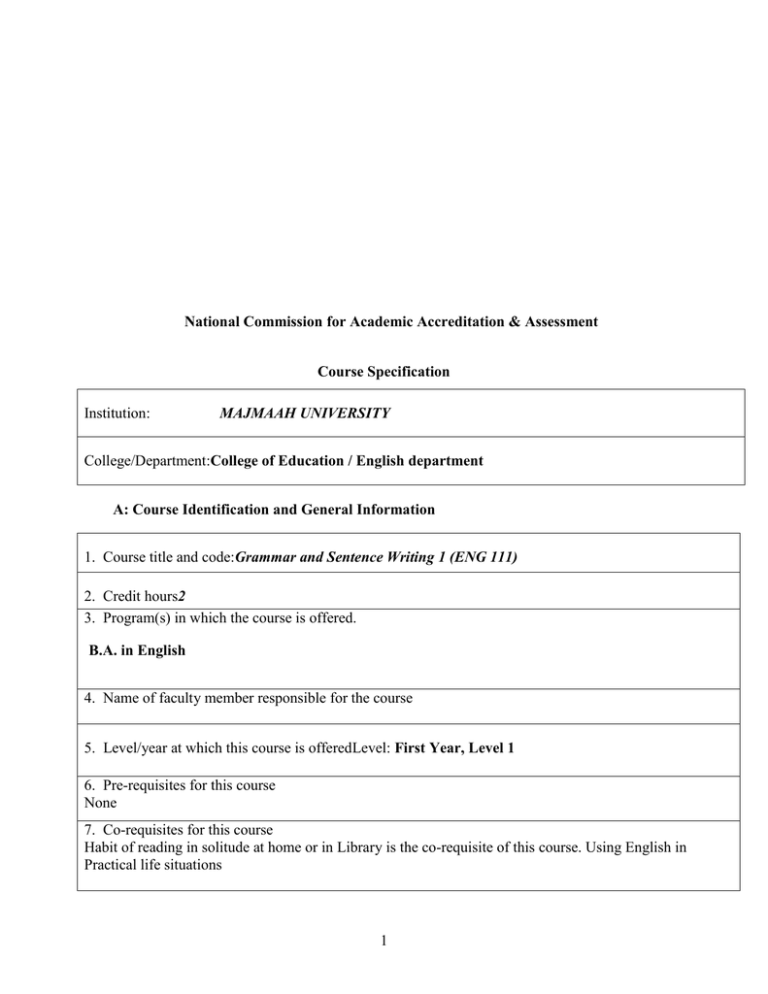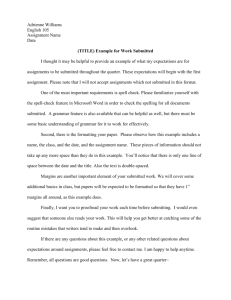
National Commission for Academic Accreditation & Assessment
Course Specification
Institution:
MAJMAAH UNIVERSITY
College/Department:College of Education / English department
A: Course Identification and General Information
1. Course title and code:Grammar and Sentence Writing 1 (ENG 111)
2. Credit hours2
3. Program(s) in which the course is offered.
B.A. in English
4. Name of faculty member responsible for the course
5. Level/year at which this course is offeredLevel: First Year, Level 1
6. Pre-requisites for this course
None
7. Co-requisites for this course
Habit of reading in solitude at home or in Library is the co-requisite of this course. Using English in
Practical life situations
1
8. Location if not on main campus
not applicable
B: Objectives:
This course is designed for the undergraduate English-majored students at the College of
Education, Majmaah University. There is no pre-requisite for this course. The aim of
thiscourse is to develop the abilities of the students to use and understand the basic
sentencestructures effectively.
i: Use Grammatically correct sentences
ii: Recognize the mistakes/errors while communicating or writing again
iii: Demonstrate an ability to speak grammatically correct English
iv: Differentiate among different parts of speech
v: Know meaning of verb tenses
vi: Be familiar with different grammatical rules of English
vii: Appreciate the use of different grammatical structures to express themselves
Learning Outcomes:
Express themselves in good English orally and in writing.
Identify and use the basic parts of the English sentence.
Use simple sentence structure.
Use ‘to be’ and ‘to do’ in written and oral communication.
Use adverbs of frequency correctly.
Use the present progressive and the past simple correctly.
Identify and use nouns and pronouns correctly.
Use punctuation correctly
C:Course Description(Note: General description in the form to be used for the Bulletin
or Handbook should be attached)
1. Topics to be Covered
2
List of Topics
No of
Weeks
Contact hours
Introduction & Simple sentence structure
2
4
Using be
2
4
Using be and have
2
4
Using the simple present
2
4
Using the present progressive
2
4
Talking about the present
2
4
Nouns and pronouns
1
2
Count and non-count nouns
2
4
2. Course components (total contact hours per semester):
Lecture:HR.
Tutorial:
Laboratory
45 hours
NA
NA
Practical/Field
work/Internship
N/A
3. Additional private study/learning hours expected for students per week.
3-4 hours.
4. Development of Learning Outcomes in Domains of Learning
For each of the domains of learning shown below indicate
a. Knowledge:
(i) Description of the knowledge to be acquired
i: Recognize the mistakes/errors while communicating or writing again
ii: Demonstrate an ability to speak grammatically correct English
iii: Differentiate among different parts of speech
3
Other:
iv: Know meaning of verb tenses
v: Be familiar with different grammatical rules of English
(ii) Teaching strategies to be used to develop that knowledge.
Lectures - group discussion. Brain storming
(iii) Methods of assessment of knowledge acquired
Quiz -- Assignments – mid- term exam- final exam
b. Cognitive Skills
(i) Description of cognitive skills to be developed
1: Ability to read and write critically and analytically
2: Ability to use grammar to summarize, analyze, compare and contrast.
3: Ability to apply different critical approaches to grammar
4:Ability to differentiate between simple and critical study and its retention of information and manipulating
into individual's ingenious creative work.
(ii) Teaching strategies to be used to develop these cognitive skills
1. Lectures and workshops to teach students how to read, write and evaluate attentively and critically.
2. Class discussions to train students to think independently and engage in group discussions.
3. Individual meetings with students to encourage the students to discuss subject topics outside the
class room with the instructor.
(iii) Methods of assessment of students cognitive skills
Exercises – assignments– mid- term exam – final exam
c. Interpersonal Skills and Responsibility
1. In-class assignments and homework in due time
2. Students participation in class
3. Students can act responsibly and ethically when participating in group work
4. Students should have the necessary skills to communicate, listen, negotiate, and evaluate their
strengths and weaknesses as members of a team
4
(ii) Teaching strategies to be used to develop these skills and abilities
1. Lectures/Workshops
2. Classroom Discussions
3. Presentations
4. Internet Search
(iii) Methods of assessment of students interpersonal skills and capacity to carry responsibility
1: Active classroom participation reflects the students’ ability to keep up with the class schedule.
2: Writing as well as Assignments will attest to the student’s ability to complete task and care for the dead
lines
3: Performance on midterms and final exams are evidence of the student’s ability to recollect and synthesize
information
4: Instructor’s assessment of student’s performance and seriousness during individual supervision hours
d. Communication, Information Technology and Numerical Skills
(i) Description of the Skills to be Developed in this Domain.
1:Use of Electronic Journals
2: Web CT
3: Use of Smart Board Technology
(ii) Teaching Strategies to be used to develop these Skills
1: Encourage students to make extensive use of material on the web
2: Encourage students to consult the specialist in the computer lab for help on web-based material
3: Use of dramatic expression while expressing their presentation
(iii) Methods of Assessment of Students Numerical and Communication Skills
1: Allot marks for the use of collection of web-based material in students' Presentations but make sure that
there must not be plagiarism.
2:Distribute rubric at beginning of assignment so students know what they will be evaluated on
e. Psychomotor Skills (if applicable)
(i) Description of the psychomotor skills to be developed and the level of performance required
5
The students will be engaged in practical work in such a way that they can perform different activities in
guided or free way to employ their knowledge and skill in a practical way. It will shun away their fear of
speech and presentation culminating into more confidence in their discourse.
(ii) Teaching strategies to be used to develop these skills
1: To monitor the time given to reading and writing at home on regular basis
2: To grade the work, participation and attendance from the very beginning of the term
3: To evaluate the absorption of language read in the text of the plays into practical manifestation of the
students by different means
(iii) Methods of assessment of students psychomotor skills
1: Classroom participation
2: Quizzes
3: Answering /Questioning
3: Tests/Assignments
4: Mid Term Tests
5: Follow Up
5. Schedule of Assessment Tasks for Students During the Semester
Assessment
Assessment task (eg. essay, test, group project,
examination etc.)
Each
week
1
IstIn-Term Exam
5th
15
2
2nd In-Term Exam
12th
15
3
Participation
4
Final Exams
10
17th
60
D. Student Support
1. Arrangements for availability of teaching staff for individual student consultations and academic advice.
1- 2-3 hours for academic consultation
2- email contact: march19majmah@hotmail.com
E: Learning Resources
Course book:
Basic English Grammar third edition
6
Betty SchrampferAzar, Stacy A. Hagen,
PEARSON Longman
(2006)
Other learning rsources:
‘‘English Grammar in use’’ by Raymond Murphy (Third Edition) Cambridge University Press, 2010
Websites Resources:
www.cambridge.org
www.learnenglish.com
www.englishgrammar.com
www.englishclub.com
F. Facilities Required
Indicate requirements for the course including size of classrooms and laboratories (ie number of seats in
classrooms and laboratories, extent of computer access etc.)
1. Accommodation (Lecture rooms, laboratories, etc.)
-Large rooms
-Library
2. Computing resources
Computer are available with an internet access- digital libraries
3. Other resources
G Course Evaluation and Improvement Processes
1 Strategies for Obtaining Student Feedback on Effectiveness of Teaching
Questionnaires
Course assessment Q.
Program assessment Q.
Constant meetings between both the teaching staff and the students.
2 Other Strategies for Evaluation of Teaching by the Instructor or by the Department
Assessment by the head of the English Department
External English evaluator
3 Processes for Improvement of Teaching
7
Self enhancement –
Teacher development courses/workshop
Using the latest technology for teaching.
4. Processes for Verifying Standards of Student Achievement.
Internal evaluators
Externalevaluators
5 Describe the planning arrangements for periodically reviewing course effectiveness and planning for
improvement.
Throughout an accurate revision of :
1-The Course report, the course assessment questionnaire
2- Staff meetings to discuss the latest research in the English teaching field.
3- Redesigning the English department curriculum.
8



